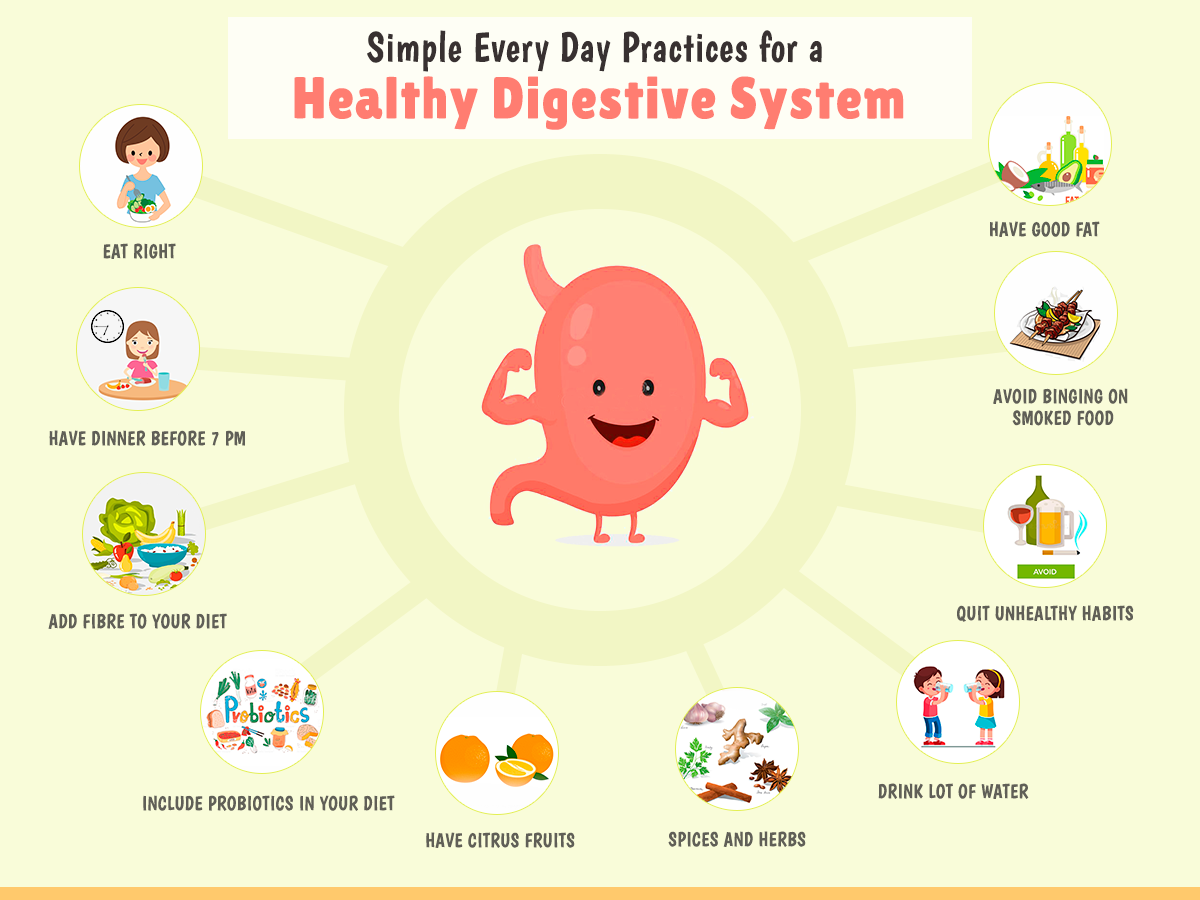Simple Every Day Practices for a Healthy Digestive System
“We Are What We Eat”
So, it is very important that we eat nutritious food and that the food that we eat is properly digested so that the body receives the nutrients from the food.
It is common knowledge that the digestion process begins in the mouth. When the teeth grind the food and break it down to bit-sized particles, the enzymes in the saliva break it further down. The broken-down food then travels down the oesophagus (food pipe) to the stomach. Here, gastric juices produced by the stomach walls, digestive enzymes from the liver and bile from the liver work together to break down food to its nutrient components completely. The microbes in the gut also play a vital role in this process.
How to Ensure Proper Digestion of Food
Here are the tips to improve your digestion naturally

Embed This Image On Your Site (copy code below):
Eat Right
The first tip for better digestion is to eat slowly and calmly. Grind the food properly with the teeth so that the maximum breakdown of food happens in the mouth by the action of the salivary enzymes. Preferably have vegetable and plant-based foods and avoid refined carbohydrates and sugars.
Have dinner before 7 pm
It is an ancient practice to have an early dinner. The digestive ability of the gut is highest when the sunlight is at the highest and reduces as the day turns into night. So, it is always recommended to have a large meal at noon and a simple meal at night for a healthy digestive system. Some nutritionists in Bangalore are of the opinion that late-night eating could lead to fat accumulation and toxin generation, which is not good for health.
Add Fibre to Your Diet
Vegetables, fruits, nuts and whole grains have high amounts of fibres. It is important to have a fibre-rich diet as the fibre soaks up water and softens the stool, making it easier for it to pass through the intestines. A low-fibre diet could lead to stool hardening, that will not only lead to constipation but other digestive problems. If you have been having a low-fibre diet, gradually increase the fibre content in your food, so your body is able to adapt to the change.
Include Probiotics in your Diet
Probiotics contain “friendly” bacteria like the bifidobacteria and lactobacilli that can aid digestion. They also increase acidic levels in the stomach, which prevents the growth of harmful bacteria. Probiotics also enhance gut health. A few common probiotics that you can add to your diet are apple cider vinegar, dark chocolate, yoghurt and Kimchi.
Have Citrus Fruits
Citrus fruits like lemon and orange activate the salivary glands and pancreatic secretions and also create a healthy environment in the gut for the “good” bacteria. You can also drink orange lime mint or ginger lime mint after a meal to enhance digestion.
Read also: 15 Best Fruits For Diabetes
Spices and Herbs
Coriander, peppercorn, cumin, chilli, ginger and turmeric enhance secretion of bile from the liver, which aids fat and carbohydrate digestion. Ginger, chilli and peppercorn trigger the production of the pancreatic trypsin enzyme that helps in protein digestion. Fennel seeds, cinnamon and peppermint, are carminatives that reduce acid reflux and relieves bloating and gas.
Drink Lot of water
You need to drink a lot of water for the fibres to work properly. If you talk to the best nutritionist in Bangalore, they suggest that women should drink 2.1 to 2.3 litres per day and men should have around 2.6 to 2.8 litres per day. The amount of water depends on physical activity and weather conditions.
Quit Unhealthy Habits
Quit smoking as it can cause stomach ulcer, which weakens the inner muscles of the food pipe and hampers digestion. Smoking also causes acid reflux, which could cause bowel inflammation. Reduce alcohol consumption as increased levels of alcohol in blood could elevate acidic levels of the stomach, causing perforations on the stomach wall. It can also cause heartburn.
Avoid binging on smoked food
Preferably reduce consumption of burnt (tandoori) food as smoked food can increase the levels of toxins in the stomach, which can increase acidic levels leading to perforations on the stomach wall. Increased consumption could also lead to cancer.
Have Good Fat
Add good fat like almond, coconut, walnut and olive oil to your diet to promote gut bacteria growth and reduce gut inflammation.
Following these simple tips for healthy digestive system can give you effective solutions in the long run. Stay healthy by eating healthy.





No Comments